Corporate Law: Analysis of Fiduciary Duties and Transactions
VerifiedAdded on 2020/03/04
|7
|1331
|62
Report
AI Summary
This report analyzes a corporate law case involving LIV Pte Ltd, a startup company, and its directors. The report examines the fiduciary duties of directors, including the duty of loyalty and care, and how these duties were potentially breached through related party transactions and acquisitions. The case explores scenarios where directors authorized loans to related entities and acquired a company at an inflated value, raising concerns about conflicts of interest and shareholder rights. The report addresses the liabilities of directors, the defenses available to them, and the remedies shareholders can pursue, including the right to challenge transactions and seek the removal of directors. The analysis is based on relevant corporate law principles, including the Companies Act and the rule in Foss v Harbottle, and considers the implications of whistleblower letters and shareholder complaints. The report highlights the importance of transparency, good faith, and proper corporate governance in protecting shareholder interests and ensuring the ethical conduct of directors.
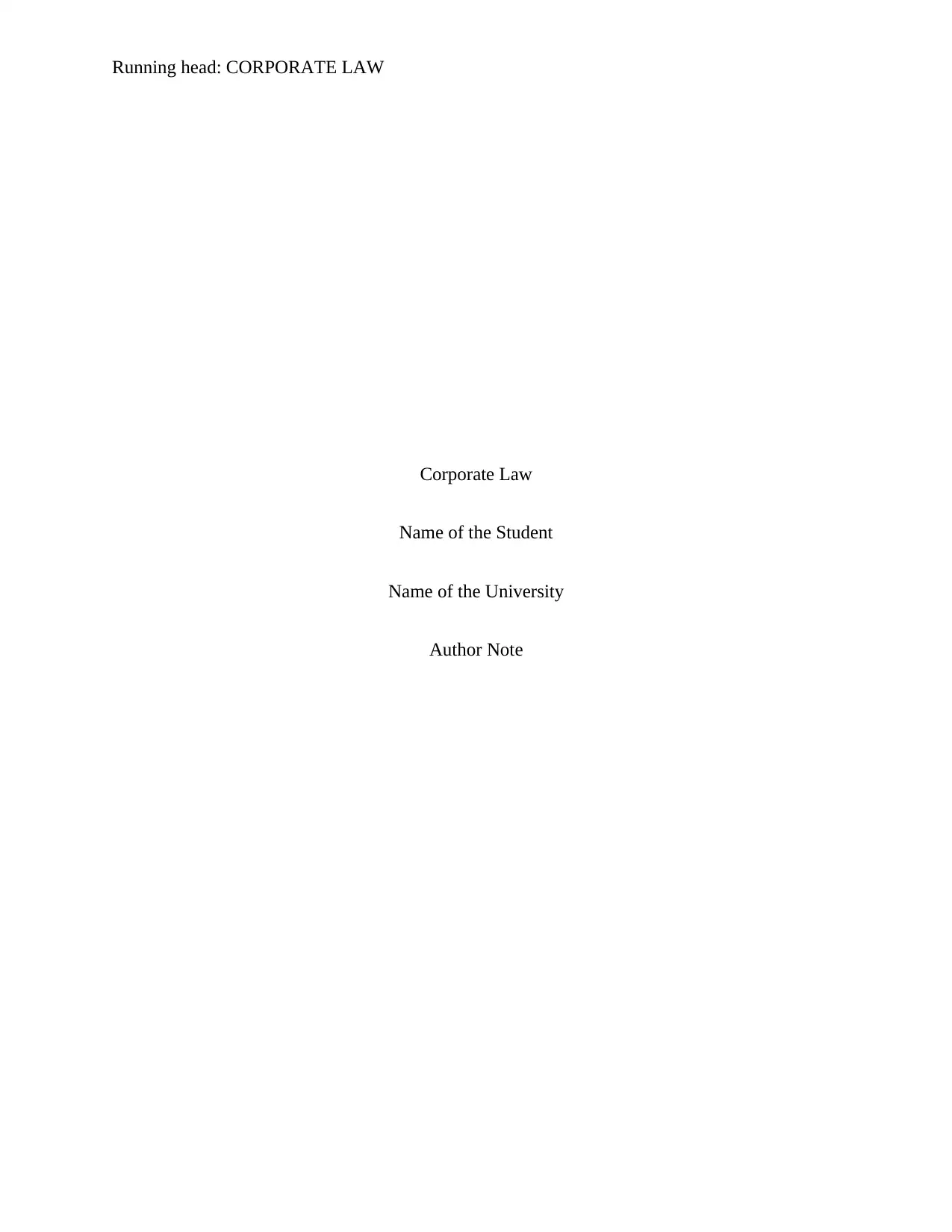
Running head: CORPORATE LAW
Corporate Law
Name of the Student
Name of the University
Author Note
Corporate Law
Name of the Student
Name of the University
Author Note
Paraphrase This Document
Need a fresh take? Get an instant paraphrase of this document with our AI Paraphraser
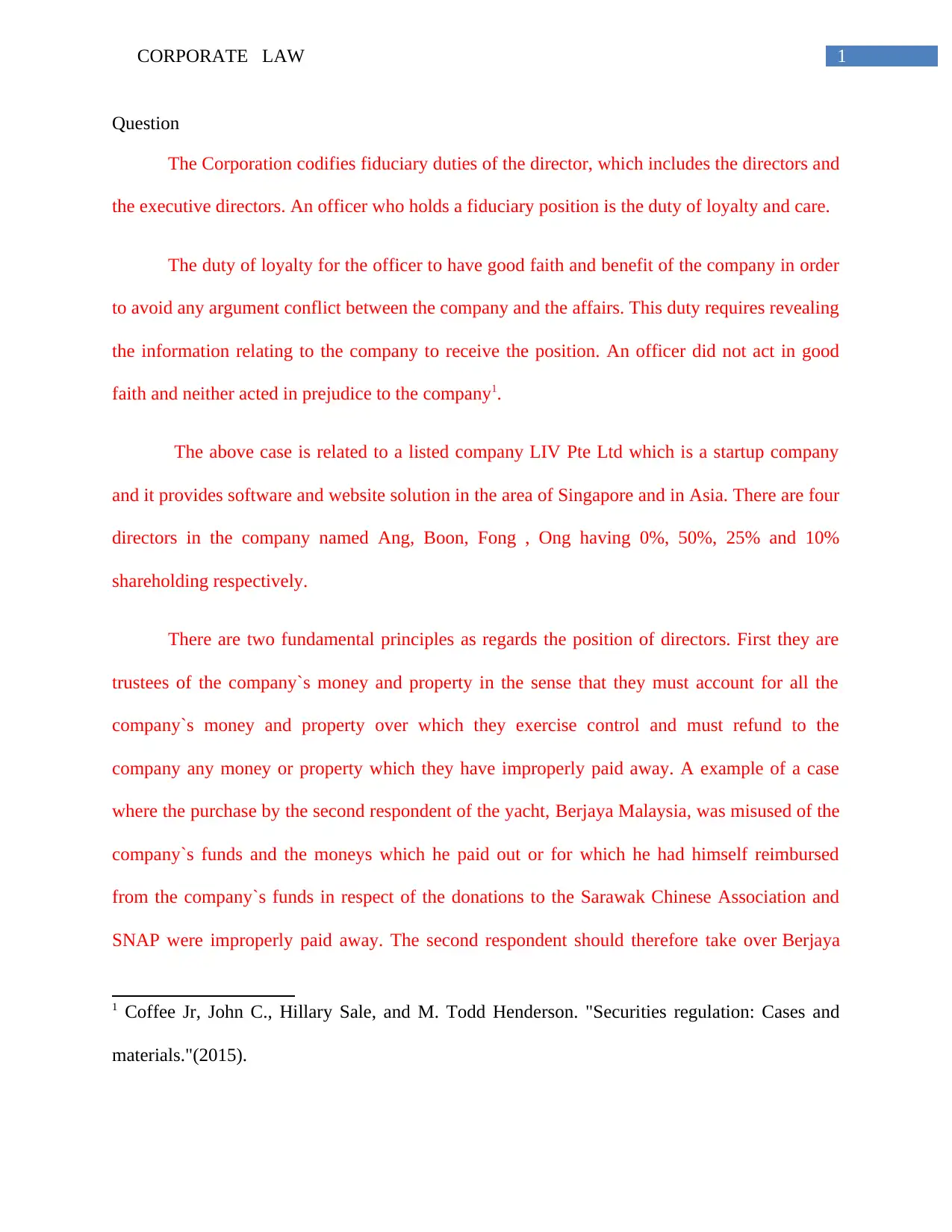
1CORPORATE LAW
Question
The Corporation codifies fiduciary duties of the director, which includes the directors and
the executive directors. An officer who holds a fiduciary position is the duty of loyalty and care.
The duty of loyalty for the officer to have good faith and benefit of the company in order
to avoid any argument conflict between the company and the affairs. This duty requires revealing
the information relating to the company to receive the position. An officer did not act in good
faith and neither acted in prejudice to the company1.
The above case is related to a listed company LIV Pte Ltd which is a startup company
and it provides software and website solution in the area of Singapore and in Asia. There are four
directors in the company named Ang, Boon, Fong , Ong having 0%, 50%, 25% and 10%
shareholding respectively.
There are two fundamental principles as regards the position of directors. First they are
trustees of the company`s money and property in the sense that they must account for all the
company`s money and property over which they exercise control and must refund to the
company any money or property which they have improperly paid away. A example of a case
where the purchase by the second respondent of the yacht, Berjaya Malaysia, was misused of the
company`s funds and the moneys which he paid out or for which he had himself reimbursed
from the company`s funds in respect of the donations to the Sarawak Chinese Association and
SNAP were improperly paid away. The second respondent should therefore take over Berjaya
1 Coffee Jr, John C., Hillary Sale, and M. Todd Henderson. "Securities regulation: Cases and
materials."(2015).
Question
The Corporation codifies fiduciary duties of the director, which includes the directors and
the executive directors. An officer who holds a fiduciary position is the duty of loyalty and care.
The duty of loyalty for the officer to have good faith and benefit of the company in order
to avoid any argument conflict between the company and the affairs. This duty requires revealing
the information relating to the company to receive the position. An officer did not act in good
faith and neither acted in prejudice to the company1.
The above case is related to a listed company LIV Pte Ltd which is a startup company
and it provides software and website solution in the area of Singapore and in Asia. There are four
directors in the company named Ang, Boon, Fong , Ong having 0%, 50%, 25% and 10%
shareholding respectively.
There are two fundamental principles as regards the position of directors. First they are
trustees of the company`s money and property in the sense that they must account for all the
company`s money and property over which they exercise control and must refund to the
company any money or property which they have improperly paid away. A example of a case
where the purchase by the second respondent of the yacht, Berjaya Malaysia, was misused of the
company`s funds and the moneys which he paid out or for which he had himself reimbursed
from the company`s funds in respect of the donations to the Sarawak Chinese Association and
SNAP were improperly paid away. The second respondent should therefore take over Berjaya
1 Coffee Jr, John C., Hillary Sale, and M. Todd Henderson. "Securities regulation: Cases and
materials."(2015).
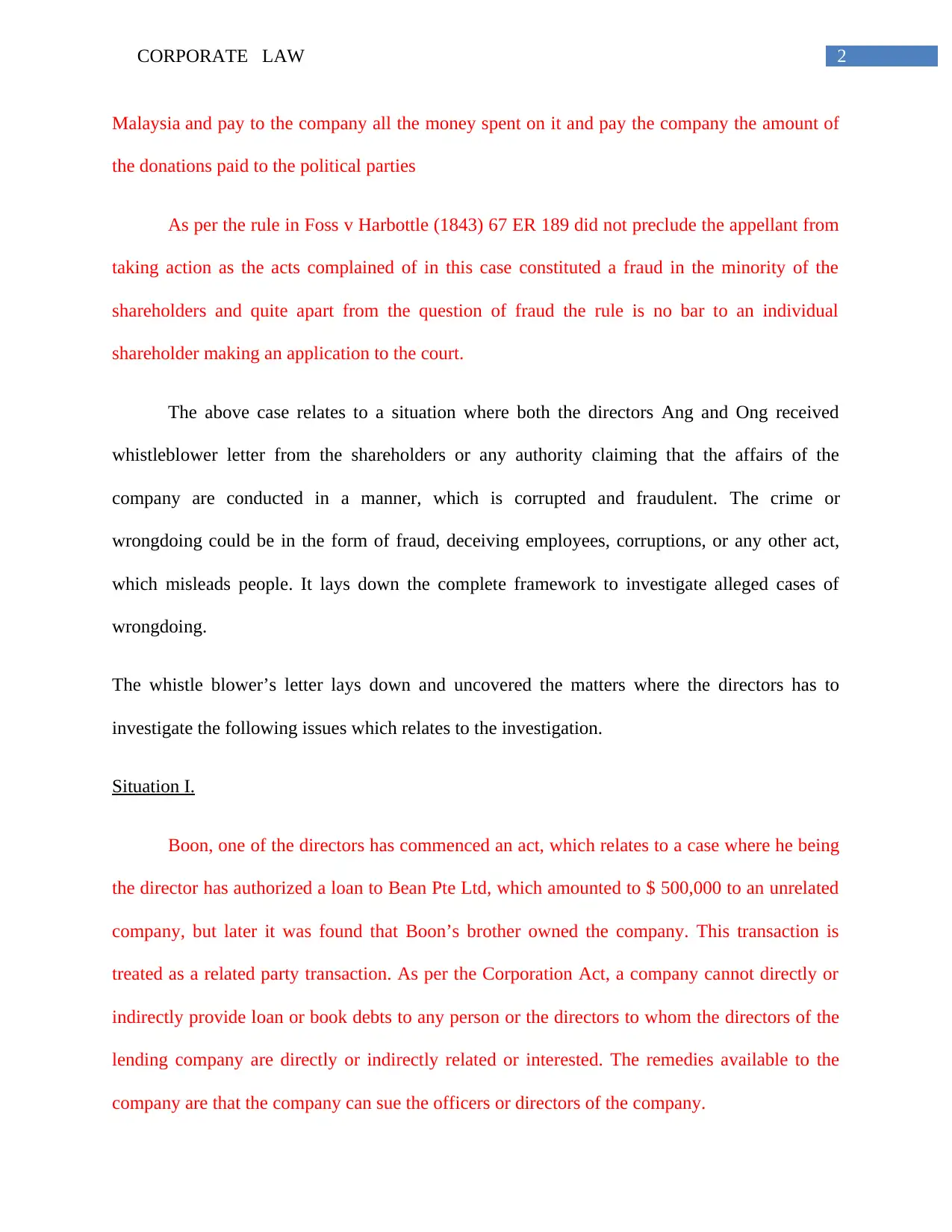
2CORPORATE LAW
Malaysia and pay to the company all the money spent on it and pay the company the amount of
the donations paid to the political parties
As per the rule in Foss v Harbottle (1843) 67 ER 189 did not preclude the appellant from
taking action as the acts complained of in this case constituted a fraud in the minority of the
shareholders and quite apart from the question of fraud the rule is no bar to an individual
shareholder making an application to the court.
The above case relates to a situation where both the directors Ang and Ong received
whistleblower letter from the shareholders or any authority claiming that the affairs of the
company are conducted in a manner, which is corrupted and fraudulent. The crime or
wrongdoing could be in the form of fraud, deceiving employees, corruptions, or any other act,
which misleads people. It lays down the complete framework to investigate alleged cases of
wrongdoing.
The whistle blower’s letter lays down and uncovered the matters where the directors has to
investigate the following issues which relates to the investigation.
Situation I.
Boon, one of the directors has commenced an act, which relates to a case where he being
the director has authorized a loan to Bean Pte Ltd, which amounted to $ 500,000 to an unrelated
company, but later it was found that Boon’s brother owned the company. This transaction is
treated as a related party transaction. As per the Corporation Act, a company cannot directly or
indirectly provide loan or book debts to any person or the directors to whom the directors of the
lending company are directly or indirectly related or interested. The remedies available to the
company are that the company can sue the officers or directors of the company.
Malaysia and pay to the company all the money spent on it and pay the company the amount of
the donations paid to the political parties
As per the rule in Foss v Harbottle (1843) 67 ER 189 did not preclude the appellant from
taking action as the acts complained of in this case constituted a fraud in the minority of the
shareholders and quite apart from the question of fraud the rule is no bar to an individual
shareholder making an application to the court.
The above case relates to a situation where both the directors Ang and Ong received
whistleblower letter from the shareholders or any authority claiming that the affairs of the
company are conducted in a manner, which is corrupted and fraudulent. The crime or
wrongdoing could be in the form of fraud, deceiving employees, corruptions, or any other act,
which misleads people. It lays down the complete framework to investigate alleged cases of
wrongdoing.
The whistle blower’s letter lays down and uncovered the matters where the directors has to
investigate the following issues which relates to the investigation.
Situation I.
Boon, one of the directors has commenced an act, which relates to a case where he being
the director has authorized a loan to Bean Pte Ltd, which amounted to $ 500,000 to an unrelated
company, but later it was found that Boon’s brother owned the company. This transaction is
treated as a related party transaction. As per the Corporation Act, a company cannot directly or
indirectly provide loan or book debts to any person or the directors to whom the directors of the
lending company are directly or indirectly related or interested. The remedies available to the
company are that the company can sue the officers or directors of the company.
⊘ This is a preview!⊘
Do you want full access?
Subscribe today to unlock all pages.

Trusted by 1+ million students worldwide
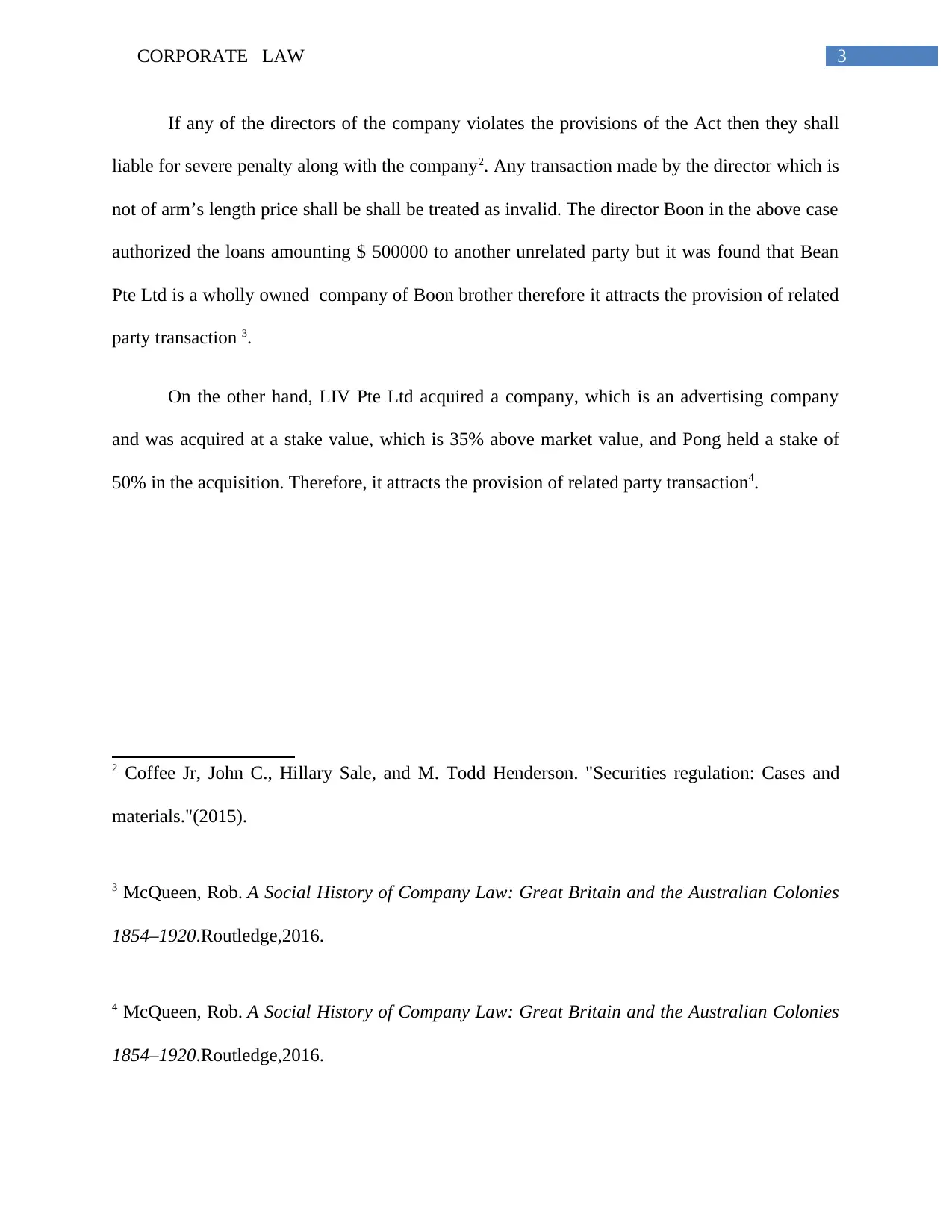
3CORPORATE LAW
If any of the directors of the company violates the provisions of the Act then they shall
liable for severe penalty along with the company2. Any transaction made by the director which is
not of arm’s length price shall be shall be treated as invalid. The director Boon in the above case
authorized the loans amounting $ 500000 to another unrelated party but it was found that Bean
Pte Ltd is a wholly owned company of Boon brother therefore it attracts the provision of related
party transaction 3.
On the other hand, LIV Pte Ltd acquired a company, which is an advertising company
and was acquired at a stake value, which is 35% above market value, and Pong held a stake of
50% in the acquisition. Therefore, it attracts the provision of related party transaction4.
2 Coffee Jr, John C., Hillary Sale, and M. Todd Henderson. "Securities regulation: Cases and
materials."(2015).
3 McQueen, Rob. A Social History of Company Law: Great Britain and the Australian Colonies
1854–1920.Routledge,2016.
4 McQueen, Rob. A Social History of Company Law: Great Britain and the Australian Colonies
1854–1920.Routledge,2016.
If any of the directors of the company violates the provisions of the Act then they shall
liable for severe penalty along with the company2. Any transaction made by the director which is
not of arm’s length price shall be shall be treated as invalid. The director Boon in the above case
authorized the loans amounting $ 500000 to another unrelated party but it was found that Bean
Pte Ltd is a wholly owned company of Boon brother therefore it attracts the provision of related
party transaction 3.
On the other hand, LIV Pte Ltd acquired a company, which is an advertising company
and was acquired at a stake value, which is 35% above market value, and Pong held a stake of
50% in the acquisition. Therefore, it attracts the provision of related party transaction4.
2 Coffee Jr, John C., Hillary Sale, and M. Todd Henderson. "Securities regulation: Cases and
materials."(2015).
3 McQueen, Rob. A Social History of Company Law: Great Britain and the Australian Colonies
1854–1920.Routledge,2016.
4 McQueen, Rob. A Social History of Company Law: Great Britain and the Australian Colonies
1854–1920.Routledge,2016.
Paraphrase This Document
Need a fresh take? Get an instant paraphrase of this document with our AI Paraphraser
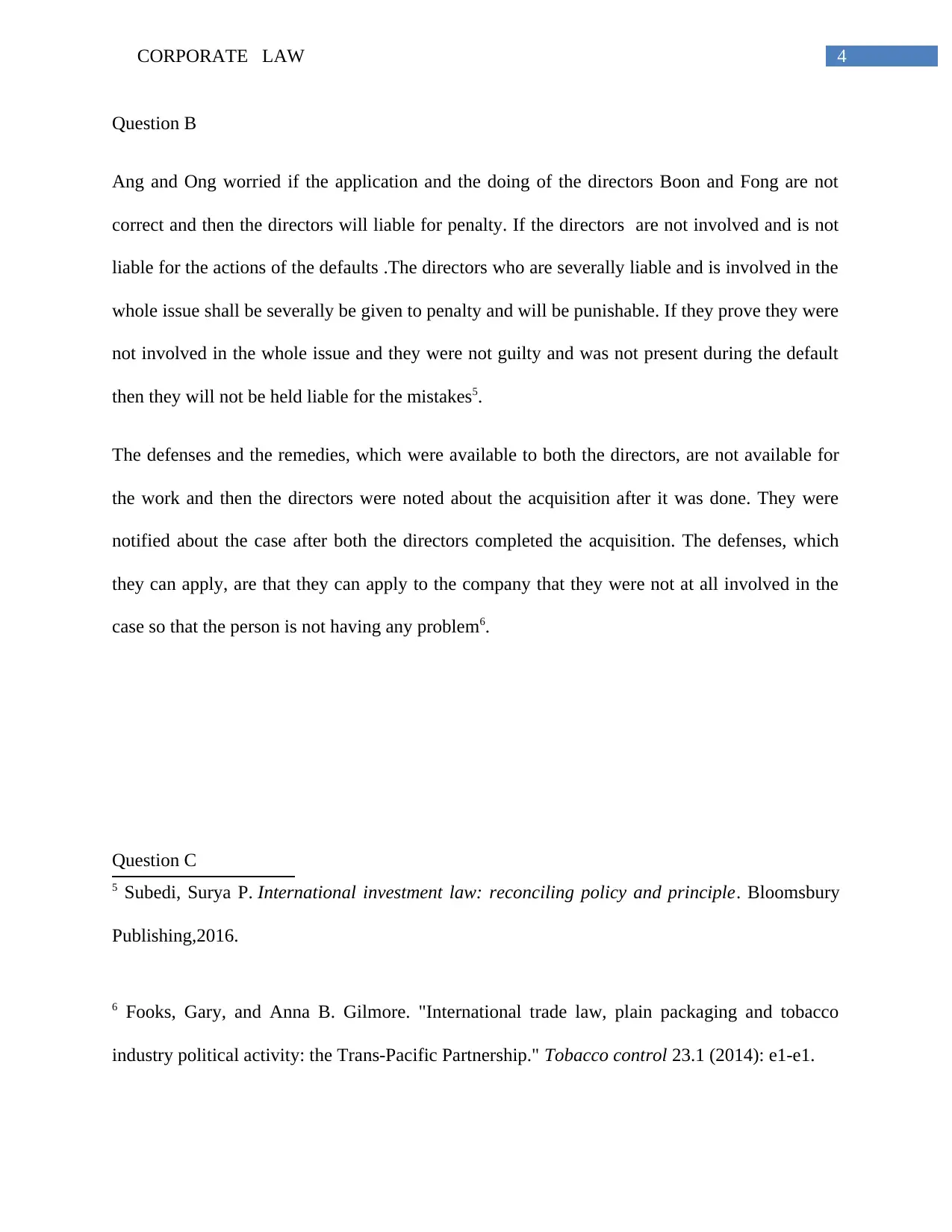
4CORPORATE LAW
Question B
Ang and Ong worried if the application and the doing of the directors Boon and Fong are not
correct and then the directors will liable for penalty. If the directors are not involved and is not
liable for the actions of the defaults .The directors who are severally liable and is involved in the
whole issue shall be severally be given to penalty and will be punishable. If they prove they were
not involved in the whole issue and they were not guilty and was not present during the default
then they will not be held liable for the mistakes5.
The defenses and the remedies, which were available to both the directors, are not available for
the work and then the directors were noted about the acquisition after it was done. They were
notified about the case after both the directors completed the acquisition. The defenses, which
they can apply, are that they can apply to the company that they were not at all involved in the
case so that the person is not having any problem6.
Question C
5 Subedi, Surya P. International investment law: reconciling policy and principle. Bloomsbury
Publishing,2016.
6 Fooks, Gary, and Anna B. Gilmore. "International trade law, plain packaging and tobacco
industry political activity: the Trans-Pacific Partnership." Tobacco control 23.1 (2014): e1-e1.
Question B
Ang and Ong worried if the application and the doing of the directors Boon and Fong are not
correct and then the directors will liable for penalty. If the directors are not involved and is not
liable for the actions of the defaults .The directors who are severally liable and is involved in the
whole issue shall be severally be given to penalty and will be punishable. If they prove they were
not involved in the whole issue and they were not guilty and was not present during the default
then they will not be held liable for the mistakes5.
The defenses and the remedies, which were available to both the directors, are not available for
the work and then the directors were noted about the acquisition after it was done. They were
notified about the case after both the directors completed the acquisition. The defenses, which
they can apply, are that they can apply to the company that they were not at all involved in the
case so that the person is not having any problem6.
Question C
5 Subedi, Surya P. International investment law: reconciling policy and principle. Bloomsbury
Publishing,2016.
6 Fooks, Gary, and Anna B. Gilmore. "International trade law, plain packaging and tobacco
industry political activity: the Trans-Pacific Partnership." Tobacco control 23.1 (2014): e1-e1.
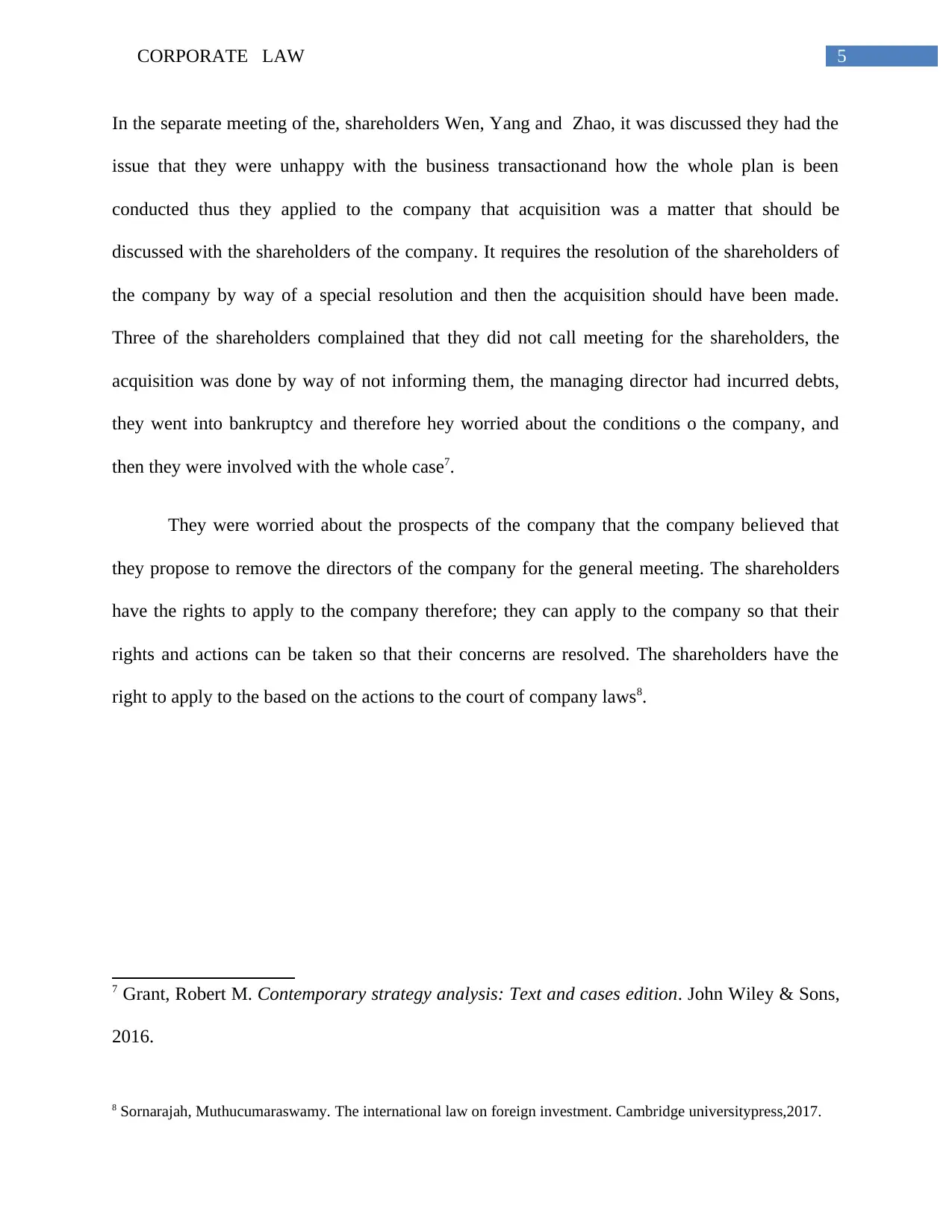
5CORPORATE LAW
In the separate meeting of the, shareholders Wen, Yang and Zhao, it was discussed they had the
issue that they were unhappy with the business transactionand how the whole plan is been
conducted thus they applied to the company that acquisition was a matter that should be
discussed with the shareholders of the company. It requires the resolution of the shareholders of
the company by way of a special resolution and then the acquisition should have been made.
Three of the shareholders complained that they did not call meeting for the shareholders, the
acquisition was done by way of not informing them, the managing director had incurred debts,
they went into bankruptcy and therefore hey worried about the conditions o the company, and
then they were involved with the whole case7.
They were worried about the prospects of the company that the company believed that
they propose to remove the directors of the company for the general meeting. The shareholders
have the rights to apply to the company therefore; they can apply to the company so that their
rights and actions can be taken so that their concerns are resolved. The shareholders have the
right to apply to the based on the actions to the court of company laws8.
7 Grant, Robert M. Contemporary strategy analysis: Text and cases edition. John Wiley & Sons,
2016.
8 Sornarajah, Muthucumaraswamy. The international law on foreign investment. Cambridge universitypress,2017.
In the separate meeting of the, shareholders Wen, Yang and Zhao, it was discussed they had the
issue that they were unhappy with the business transactionand how the whole plan is been
conducted thus they applied to the company that acquisition was a matter that should be
discussed with the shareholders of the company. It requires the resolution of the shareholders of
the company by way of a special resolution and then the acquisition should have been made.
Three of the shareholders complained that they did not call meeting for the shareholders, the
acquisition was done by way of not informing them, the managing director had incurred debts,
they went into bankruptcy and therefore hey worried about the conditions o the company, and
then they were involved with the whole case7.
They were worried about the prospects of the company that the company believed that
they propose to remove the directors of the company for the general meeting. The shareholders
have the rights to apply to the company therefore; they can apply to the company so that their
rights and actions can be taken so that their concerns are resolved. The shareholders have the
right to apply to the based on the actions to the court of company laws8.
7 Grant, Robert M. Contemporary strategy analysis: Text and cases edition. John Wiley & Sons,
2016.
8 Sornarajah, Muthucumaraswamy. The international law on foreign investment. Cambridge universitypress,2017.
⊘ This is a preview!⊘
Do you want full access?
Subscribe today to unlock all pages.

Trusted by 1+ million students worldwide
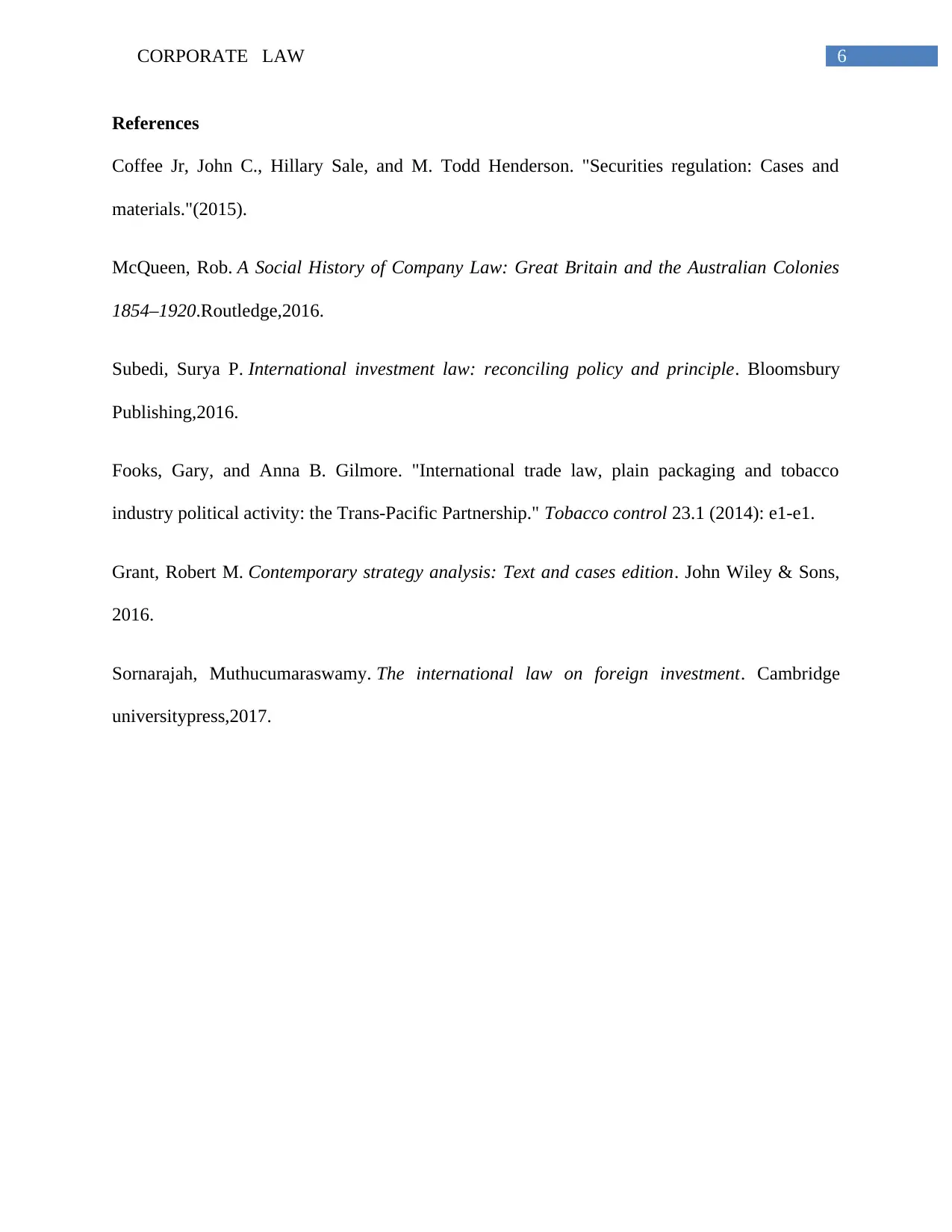
6CORPORATE LAW
References
Coffee Jr, John C., Hillary Sale, and M. Todd Henderson. "Securities regulation: Cases and
materials."(2015).
McQueen, Rob. A Social History of Company Law: Great Britain and the Australian Colonies
1854–1920.Routledge,2016.
Subedi, Surya P. International investment law: reconciling policy and principle. Bloomsbury
Publishing,2016.
Fooks, Gary, and Anna B. Gilmore. "International trade law, plain packaging and tobacco
industry political activity: the Trans-Pacific Partnership." Tobacco control 23.1 (2014): e1-e1.
Grant, Robert M. Contemporary strategy analysis: Text and cases edition. John Wiley & Sons,
2016.
Sornarajah, Muthucumaraswamy. The international law on foreign investment. Cambridge
universitypress,2017.
References
Coffee Jr, John C., Hillary Sale, and M. Todd Henderson. "Securities regulation: Cases and
materials."(2015).
McQueen, Rob. A Social History of Company Law: Great Britain and the Australian Colonies
1854–1920.Routledge,2016.
Subedi, Surya P. International investment law: reconciling policy and principle. Bloomsbury
Publishing,2016.
Fooks, Gary, and Anna B. Gilmore. "International trade law, plain packaging and tobacco
industry political activity: the Trans-Pacific Partnership." Tobacco control 23.1 (2014): e1-e1.
Grant, Robert M. Contemporary strategy analysis: Text and cases edition. John Wiley & Sons,
2016.
Sornarajah, Muthucumaraswamy. The international law on foreign investment. Cambridge
universitypress,2017.
1 out of 7
Related Documents
Your All-in-One AI-Powered Toolkit for Academic Success.
+13062052269
info@desklib.com
Available 24*7 on WhatsApp / Email
![[object Object]](/_next/static/media/star-bottom.7253800d.svg)
Unlock your academic potential
Copyright © 2020–2026 A2Z Services. All Rights Reserved. Developed and managed by ZUCOL.



